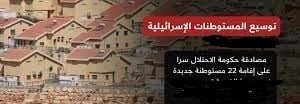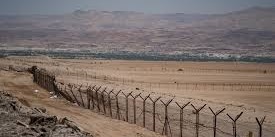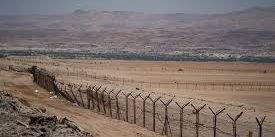By: Madeeha Al-A’raj
The National Bureau for defending land and resisting settlements stated in its latest weekly report , that , in January, 2019, the Israeli Occupation Authorities opened an apartheid road for settlers to the northeast of the Jerusalem city, called “Apartheid Street”, as it separates Palestinian drivers from Israeli settlers with a wall that extends up to 8 meters high. The road, which is numbered “4370 road”, connects the north and south of the West Bank in the E1 area near Ma’ale Adumim settlement. Knowing that the West Bank has many segregated roads, but none of them is divided along its entire length by a wall.
Minister of Occupation Army, Bennet said that opening the road is necessary as it allows Israel to build more settlements in E1 without any inconvenience, and prevents the Palestinian villages of Anata, Hizme and a-Ram after building a new road for them, but the main goal of such a decision is to separate the Israeli public transportation from that of Palestinians.
The project has been prepared 10 years ago but has not yet been approved. However, the planning procedures will now begin in cooperation with the Ministry of Transport, which will be responsible for its implementation. Under the project, Palestinian residents will be able to travel and move using their cars, without passing through Maale Adumim settlement and other settlements in the area.
Within the context, PM Netanyahu announced 2 weeks ago that he had given directions to proceed with construction plans for 3,500 housing units in the area, and the construction of the 4370 road in order the occupation government implements its plans to seize the E1 area, thus separating north of the West Bank from its south, isolating Jerusalem, and creating a geographical reality that prevents the establishment of a Palestinian State with East Jerusalem as its capital.
In Hebron, settlers stormed the Beit Ummar town, under the protection of the Israeli occupation soldiers, and placed barbed-wire fence around 11 dunums. They suspended caused the citizens from reaching their lands. Knowing that the occupation forces confiscated 25 dunums two days of the town’s lands, seized 2 Baqers – G.C.B type, and prevented citizens from the reclamation of their lands in the village of Al-Birin, south of Hebron. Moreover, a settler claimed to own more than 500 dunums of land belonging to the families of Zughair and Burqan, thus, the occupation forces expelled the farmers from their lands.
In Bethlehem, settlers uprooted 400 olive seedlings in the Sha’b Bahour area of Wadi Fukin village, west of Bethlehem, belonging by Moh’d Al-Haroub. During the past two weeks, the settlers uprooted about 800 olive trees and vineyards on the lands of Al-Khader, south of Bethlehem. While settlers cut down vine trees from the lands of Al-Khader in the Fagur area, which is surrounded by the settlements of “Daniel”, “Eliezer” and “Efrat” that were built on the lands of the citizens.
In another case, not less dangerous than settlement, the Green Peace Organization published a report showed air pollution in the Atarot industrial zone north of Jerusalem, located on the lands of the Qalandia and Beit Hanina villages, north of Jerusalem, set a record where the pollution rate reached many folds than the criteria set by the Israeli Ministry of Environmental Protection, that the Palestinians who live in the vicinity of the villages of Qalandia and Bir Nabala, Qalandiya Refugees Camp, Kafr Aqab, Al-Ram and Beit Hanina, in addition to thousands of workers in the industrial area, where the pollution leads to chronic and serious diseases such as cancer, asthma, and others.
Within the context, a report issued by the US State Department, showed that the US policies support the Israeli occupation, and deny the Jerusalemites’ rights of residing in the occupied East Jerusalem. Moreover, the annual report considered the Palestinians in the Occupied East Jerusalem as a “non-Israeli population, but living in Jerusalem.”
List of Settlers’ Assaults over the Last Week, Documented by the National Bureau:
Jerusalem:
– A Palestinian family from the Shuafat refugee camp in occupied Jerusalem demolished its own home today after it was forced to do so by the Israeli municipality. Tareq Mohammad Ali said he was forced, along with his family, to demolish their own home at the order of the Israeli High Court, under the pretext it was built without a permit.
Hebron:
– Breaking into Til-Rumeida in the center of Hebron city to celebrate the Masakhir Festival using loud music.
– Closing the main entrance of Al-Shuhada Street in the center of Hebron, and preventing citizens from entering or leaving under the pretext of settlers ’celebrations of Jewish holidays.
– Injuring youth, Moh’d Khulawi Al-Ja’bari and a woman in her thirties after settlers attacked them in Wadi Al-Husain, south of Hebron.
Bethlehem:
– Demolishing a 130 m2 house to the east of Badia area, east of Bethlehem, consists of a floor belonging to Hazem Hashem Abu Muhaimid, from the Al-Fardis village.
– Two residential establishments and a two-sheep barns east of Bethlehem, were destroyed.
Ramallah:
– Settlers attempt to kidnap two children near Turmus’ya town, north of Ramallah, after attacking their family and breaking its car.
– Monument of the martyr, Ziad Abu Ain was destroyed in Turmus’ya village, north of Ramallah by settlers.
– Jewish settlers attacked Palestinian herders while grazing livestock near the village of al-Mughayir, to the east of Ramallah in the occupied West Ban
Nablus:
– A number of citizens in Madama village, southwest of Nablus, were suffocated of tear gas, as they clashed with scores of settlers from the Itzhar settlement , built on the lands of Madama.
– Three barracks were demolished in the Ein al-Rashash area, south of Douma, southeast of Nablus, belonging to Fadel Abu Alia. The people of Burin, south of Nablus, confronted with Bracha settlers, on the outskirts of the town.
– The archaeological site was stormed in Sabastia, north of Nablus, by settlers under the protection of the Israeli occupation army.
– An attack on the homes and vehicles of citizens in the Einabus village, south of Nablus.
Jordan Valley:
– Order to remove residential tents and cattle barns in the Yarza area to the north of Jordan Valley, and the demolition of tents and cattle barns on December 23, 2019, and their tents and barns in other areas were confiscated on Jan. 1st, 2020.
 المكتب الوطني للدفاع عن الارض ومقاومة الاستيطان منظمة التحرير الفلسطينية
المكتب الوطني للدفاع عن الارض ومقاومة الاستيطان منظمة التحرير الفلسطينية




